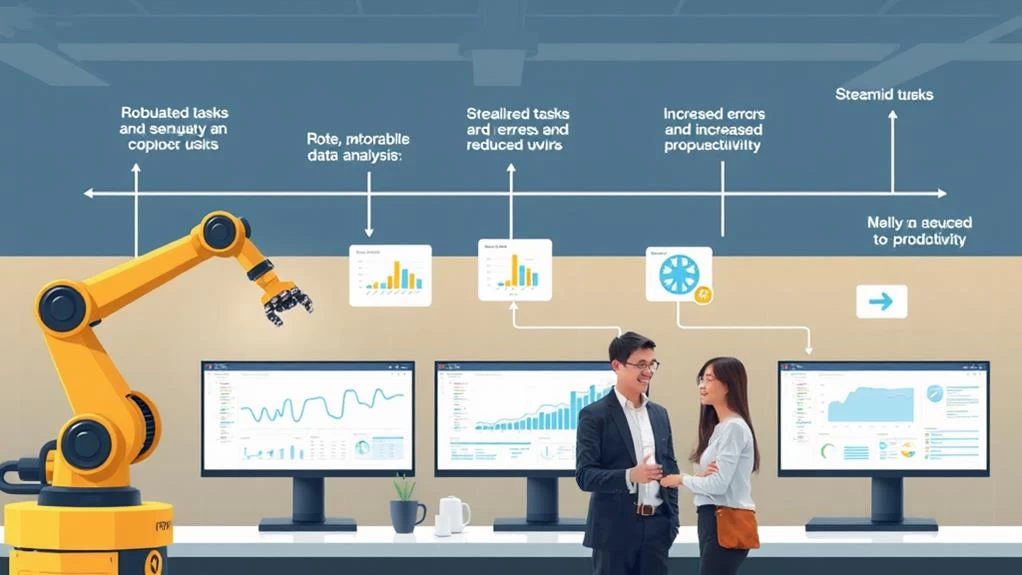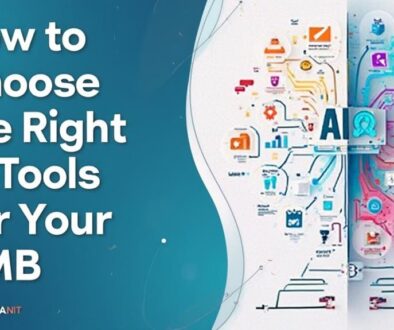The Business Benefits of AI Implementation for SMBs
AI implementation offers SMBs significant advantages, enhancing operational efficiency and reducing costs. By automating repetitive tasks, businesses can focus resources on strategic initiatives, minimizing human error and operational expenses. Advanced analytics provide deeper customer insights, enabling targeted marketing and improved engagement that drive revenue. Additionally, AI streamlines decision-making through real-time data analysis, allowing SMBs to respond proactively to market trends. This technology not only fosters innovation and adaptability but also positions businesses competitively against larger rivals. Explore how these benefits can transform your organization and lead to sustainable growth in today's dynamic landscape.
Key Takeaways
- AI implementation enhances operational efficiency by automating workflows and optimizing resource allocation, leading to reduced costs and increased productivity.
- Improved customer insights from AI analytics enable SMBs to understand behaviors and preferences, driving targeted marketing strategies and higher conversion rates.
- AI-driven cost reduction strategies streamline operations and reduce overhead expenses, freeing resources for growth and innovation.
- Streamlined decision-making is achieved with real-time data analysis, allowing SMBs to swiftly adapt to market changes and enhance strategic initiatives.
- Embracing AI provides a competitive advantage, fostering innovation and enabling SMBs to differentiate themselves in the marketplace against larger competitors.
Enhanced Operational Efficiency

In today's fast-paced business landscape, operational efficiency is the cornerstone of success for small and medium-sized businesses (SMBs). To thrive in a competitive environment, SMBs must leverage modern technologies that enhance productivity and streamline processes. The implementation of artificial intelligence (AI) plays a pivotal role in achieving enhanced operational efficiency, chiefly through automated workflows and predictive analytics.
Automated workflows simplify routine tasks, allowing employees to focus on high-impact activities that drive growth. By reducing manual intervention, businesses can minimize errors and speed up processes, thereby fostering an agile work environment. This level of automation not only increases productivity but also contributes to overall employee satisfaction, as staff are empowered to engage in more meaningful work.
Furthermore, predictive analytics serves as a transformative tool for task prioritization and resource optimization. By analyzing historical data patterns, AI systems can forecast resource needs and identify priorities that align with strategic objectives. SMBs can allocate resources more effectively and anticipate market changes, ensuring they remain responsive and agile.
Adopting AI-driven solutions encourages a culture of innovation and adaptability, providing SMBs with the flexibility to adjust strategies swiftly in response to evolving market demands.
In focusing on automated workflows and predictive analytics, businesses can optimize their operations, ultimately leading to improved performance while freeing themselves to focus on growth and expansion.
Improved Customer Insights
Utilizing AI technology allows small and medium-sized businesses (SMBs) to access deeper insights into their customer behaviors and preferences. This advancement fuels the imperative for personalized marketing strategies, enabling businesses to tailor their offerings in a way that resonates with individual customers.
By leveraging AI-driven analytics, SMBs can track how customers interact with their products and services, identifying patterns and trends that were previously difficult to discern. Understanding customer behavior through AI equips businesses with the ability to anticipate customer needs and expectations.
For instance, predictive analytics can reveal which products are more likely to catch a customer's interest based on their past interactions, allowing for targeted promotions that appeal directly to them. The result is a more meaningful customer experience, fostering loyalty and satisfaction.
Additionally, AI tools facilitate real-time data analysis, ensuring that insights remain current and actionable. This immediacy empowers SMBs to adjust their marketing tactics swiftly, responding dynamically to shifting customer preferences or market trends.
With such agility, businesses can cultivate a more engaged customer base, ultimately driving higher conversion rates and revenue growth. The freedom to innovate and adapt in today's fast-paced business environment is invaluable.
Cost Reduction Strategies

Small and medium-sized businesses (SMBs) seeking to enhance their financial efficiency are increasingly turning to AI for innovative cost reduction strategies. By leveraging automation tools, SMBs can streamline various operations, allowing them to shift focus from mundane tasks to growth-driven initiatives.
These tools not only reduce labor costs but also enhance precision in processes that are vulnerable to human error.
One significant area where AI can make a substantial impact is budget forecasting. Advanced algorithms analyze historical data to provide accurate financial predictions, enabling business owners to allocate resources wisely. This foresight aids in identifying potential cost-saving opportunities and avoids overspending in critical areas.
Workforce optimization is another key benefit of AI implementation. By employing AI-driven analytics, businesses can evaluate employee productivity and assign tasks more effectively, guaranteeing that human capital is utilized where it can yield the highest returns.
In parallel, AI enhances supplier management by automating communication and tracking supplier performance. This fosters stronger relationships while minimizing costs associated with manual processes.
Additionally, process automation can lead to significant reductions in overhead expenses. By automating repetitive tasks, organizations can operate leaner, freeing up resources for innovation and strategic growth.
Finally, AI-powered expense tracking tools guarantee that every dollar spent is accounted for, revealing hidden costs and providing insights for smarter spending strategies.
In essence, adopting AI-driven cost reduction strategies equips SMBs with the tools needed to thrive in an increasingly competitive landscape, paving the way for sustainable growth and financial freedom.
Streamlined Decision-Making
AI tools not only facilitate cost reductions but also pave the way for streamlined decision-making within SMBs. In an increasingly competitive environment, the ability to make informed and swift decisions can greatly impact an organization's success. By leveraging AI technologies, businesses can access real-time insights derived from vast data sets, enabling them to adopt data-driven strategies that enhance operational efficiency and responsiveness.
Predictive analytics serves as a cornerstone of this streamlined decision-making process. By analyzing historical data and identifying patterns, AI can forecast trends and potential outcomes, helping decision-makers anticipate challenges and seize opportunities. This proactive approach empowers SMBs to refine their strategies, allocate resources more effectively, and minimize uncertainties associated with decision-making.
Moreover, integrating AI-driven insights into everyday business operations reduces reliance on gut instinct or manual data analysis, which can be time-consuming and prone to errors. Instead, leaders can focus on strategic initiatives that drive growth and innovation.
The time saved in data interpretation can be redirected towards fostering creative solutions that align with the overall vision of the organization, ultimately enhancing agility.
Competitive Advantage and Growth

Harnessing the capabilities of artificial intelligence, SMBs can establish a competitive advantage that propels growth and innovation. By integrating AI-driven technologies, these enterprises can achieve significant market differentiation, allowing them to stand out against larger competitors.
For instance, AI enhances customer insights through data analytics, enabling businesses to tailor their offerings to meet specific consumer needs effectively. This personalized approach not only engenders customer loyalty but also fosters a more agile business model that can adapt to shifting market demands.
Moreover, the scalability potential of AI cannot be overstated. With automation handling repetitive tasks, SMBs free up valuable human resources to focus on strategic initiatives and creative problem-solving. This shift not only optimizes productivity but also allows for growth opportunities that may have previously seemed unattainable.
SMBs can leverage AI solutions to streamline operations, analyze trends for informed forecasting, and identify new market segments, thereby accelerating expansion efforts.
In a rapidly evolving digital landscape, staying relevant hinges on innovation and adaptability. By embracing artificial intelligence, SMBs can remain nimble and responsive to market changes, accessing avenues for growth. By leveraging AI-driven tools, these businesses can streamline operations, enhance customer experiences, and uncover valuable insights from data. This technological edge not only facilitates smarter decision-making but also plays a pivotal role in boosting branding for small businesses by enabling more personalized and targeted marketing strategies. As a result, SMBs can build stronger connections with their audience and differentiate themselves in competitive markets.
This strategic investment not only enhances existing processes but also equips businesses with the tools to navigate future challenges. In this spirit, SMBs can harness AI as a catalyst for competitive advantage, innovation, and sustained growth, confidently positioning themselves at the forefront of their industries. By leveraging these advanced technologies, companies can streamline operations, personalize customer interactions, and uncover valuable insights that drive better decision-making. One of the most transformative applications is the ability to boost SMB marketing with AI, enabling small and medium-sized businesses to tailor campaigns, optimize ad spend, and reach the right audiences more effectively. This paradigm shift empowers SMBs to compete on a level playing field with larger organizations, fostering resilience and long-term success. By leveraging AI-driven insights, SMBs can gain a deeper understanding of market trends and customer behaviors, enabling them to make more informed decisions. This foundation becomes instrumental in crafting a successful marketing strategy for SMBs, allowing businesses to deliver personalized experiences and foster stronger customer relationships. Ultimately, integrating AI ensures these organizations remain agile, adaptable, and well-prepared to seize emerging opportunities.
Frequently Asked Questions
What Initial Investments Are Required for AI Implementation in Smbs?
Implementing AI in small and medium-sized businesses necessitates careful consideration of initial investments.
Key cost considerations encompass technology infrastructure enhancements, including hardware, software, and training resources.
Additionally, organizations may need to invest in data management solutions and integration platforms to guarantee seamless AI deployment.
How Can SMBS Ensure Data Privacy When Using Ai?
In the age of burgeoning technology, where data is the modern goldmine, small-to-medium businesses (SMBs) must prioritize data privacy in AI applications.
Implementing robust data encryption techniques safeguards sensitive information while ensuring unauthorized access is thwarted.
Additionally, obtaining user consent is paramount; individuals should be informed about data usage and rights.
What Are Common Challenges Facing SMBS When Adopting Ai?
Common challenges facing SMBs when adopting AI include technology adoption hurdles, which often stem from insufficient workforce training.
Employees may struggle to adapt to new systems without proper guidance. Additionally, budget constraints can limit access to advanced AI solutions, causing delays in implementation.
Moreover, ensuring data quality is paramount as poor data can lead to ineffective AI outcomes.
Addressing these challenges is essential for successful integration and maximizing the potential benefits of AI.
How Can SMBS Measure the Success of AI Initiatives?
Measuring the success of AI initiatives can feel like steering through an uncharted ocean, with performance metrics acting as the compass guiding SMBs through the storm.
Establishing clear success criteria is paramount; it transforms abstract goals into tangible outcomes.
Businesses should focus on metrics such as increased efficiency, reduced costs, and enhanced customer satisfaction.
Are There Specific Industries Where AI Implementation Is More Beneficial for Smbs?
AI implementation proves particularly beneficial for small and medium-sized businesses across various industries.
In healthcare, it enhances optimization through improved patient management.
Retail analytics deliver targeted marketing personalization, driving customer engagement.
Manufacturing automation streamlines operations, while financial forecasting aids in strategic planning.
Customer service applications enhance user experience, and logistics management systems increase efficiency.
Moreover, AI tools in human resources improve talent acquisition and retention, demonstrating its diverse advantages across sectors.
Conclusion
The implementation of artificial intelligence within small and medium-sized businesses (SMBs) offers substantial advantages, including enhanced operational efficiency, improved customer insights, and strategic cost reductions. A remarkable statistic reveals that 86% of CEOs believe that AI will be a mainstream technology within their organizations by 2025. This trend underscores the significant potential for growth and competitive advantage that AI presents, positioning SMBs to thrive in an increasingly technology-driven marketplace. The time for embracing AI has arrived.




